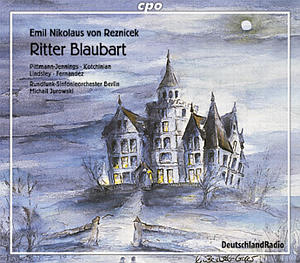As with other so-called one-work composers, and what
a misnomer that is, all of them wrote far more than one. Rezniček’s
reputation, if he has one at all, is based on the overture to his
opera Donna Diana. Now having got that over with,
one can assess him. Normally described by his biographers as a modernist,
that also proves to be not the case, for much of his music sounds
like Strauss, Humperdinck, Pfitzner and of course Wagner. Indeed,
as far as the opera Ritter Blaubart is concerned, it would
not take much to divert into the Ring or Lohengrin
in many places in this attractive work. Rezniček was an exact
contemporary of Mahler, but born where Mahler always aspired to
go (and finally made it too), the Austrian capital, Vienna. Rezniček
died at the age of 85, like Strauss who was four years his junior,
and in the same year as Webern. It is clear from what one hears
here that, unlike Webern, he took a wide berth of the route
adopted by the Second Viennese School and stuck instead to the path
of the classical-romantic tradition. The ‘von’ in his name indicates
an aristocratic background, which gave him a useful headstart when
it came to his education. His grandfather had been a respected figure
in the world of military music. Following his student years, Rezniček
took the Kapellmeister path at small theatres. He was also a military
music director in Prague, where his first three operas had great
success, before settling in Berlin in 1902, and again (for good)
in 1909 after three years in Warsaw.
In 1923 Richard Specht considered Ritter Blaubart
to be the summit of Rezniček’s music, and it’s hard to disagree
with him that this is well-written, solidly crafted music, if
densely scored in places. Count Bluebeard (he ‘actually’ had a
thick, dark, black beard if legend is to be believed) was
famed for his unusual sex appeal and prowess, and was doomed to
bear a destiny which led women into ruin. Such was the attraction
of this tale that one finds settings going back to Grétry
in 1789, followed by Offenbach, Dukas and Bartók, so the
story has lost little of its impact over the years. Rezniček’s
librettist was Herbert Eulenberg, whose play was performed for
the first time in Berlin in 1906, but suffered at the hands of
faction fighting and political intrigue within theatrical circles.
It enjoyed more deserved praise when it reappeared (necessarily
shortened) as the libretto of Rezniček’s opera after its
celebrated premiere in Darmstadt in 1920 conducted by the Hans
Richter-protégé Michael Balling. In Berlin the opera thrived under
Leo Blech’s guidance with 27 performances in the six years
following its first staging there on 31 October 1920.
Though the story is an utterly gloomy one, it
gives wonderful scope for a kaleidoscopic range of emotion and
dramatic situation. Blaubart kills his first wife when he finds
her in the arms of her lover, but then goes on to kill her five
successors because they have dared to enter a room in which his
initial secret is locked. By the time Judith, daughter of Count
Nikolaus, has become his seventh wife, the locked room contains
the heads of her six predecessors. In his absence she is entrusted
with the room’s golden key and, despite being warned not to enter,
disobeys him. Because the key immediately becomes indelibly stained
with blood, the secret is out and she suffers the same fate as
all his other wives. At her burial Blaubart seduces her sister
Agnes, who agrees to follow him back to his castle. Blaubart’s
blind servant Josua seeks to forestall her fate by setting fire
to the castle in an attempt to destroy all the evidence. But this
only serves to make Blaubart confess to Agnes what he has done
to her sister, and, in despair she promptly throws herself from
a balcony leaving Blaubart to perish in the flames.
Melodramatic though this all is, the musical
result is impressive, and the performance here under Michail Jurowski
utterly convincing. All the soloists are more than equal to the
task, some of it as demanding as anything Wagner ever made of
his singers. The orchestral interludes, which frankly contain
the best music (begging the question why Rezniček
never put together a purely orchestral tone poem consisting of
this music) are superbly played by the Berlin Radio Orchestra.
Rezniček now deserves more than to be regarded as the composer
of just one overture, that of Donna Diana, and cpo
has done his cause proud with the release of this opera.
Christopher Fifield
|
Error processing SSI file
|
